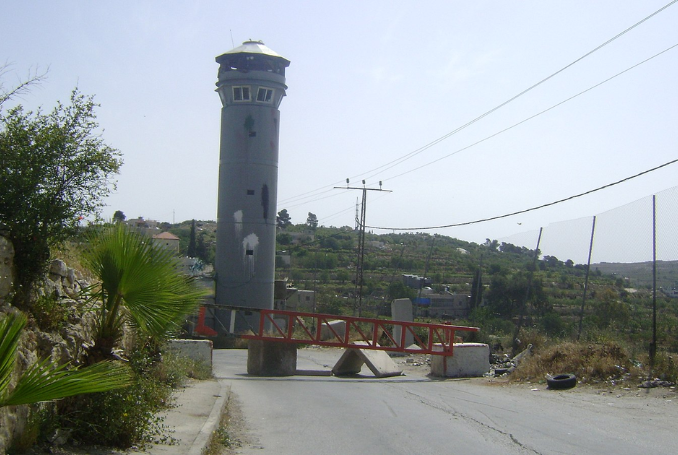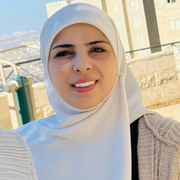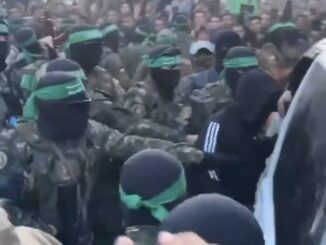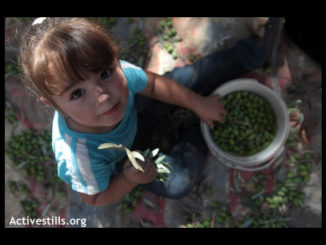
Settlement roads, or ‘bypass roads’, are consuming vast areas of the occupied West Bank, altering its geography and increasing Palestinians’ suffering to prioritize the convenience and security of illegal Jewish settlers.
Ra’fat Dumaidi can no longer access the land he inherited from his father and grandparents in his town of Huwwara, south of Nablus.
Dumaidi’s land, along with hundreds of other dunams of the village’s lands, was confiscated by Israeli occupation forces to make way for a new settlement road that serves several settlements near Nablus.
‘They Stole My Land and Trees’
When work began on the settlement road adjacent to Huwwara in 2020, Israel issued an order to confiscate hundreds of dunams of the town’s lands, including Dumaidi’s.
The man attempted to challenge the Israeli order, but Israeli soldiers expelled him and warned him never to set foot on the land again.
While there, Dumaidi noticed that all his olive trees had been uprooted and discarded. When he tried to gather them for harvesting, soldiers attacked him.
“They stole my land and my trees. All the beautiful lands in the Huwwara Plain were bulldozed and we were banned from accessing them,” he told the Palestine Chronicle.
Worse yet, Palestinians were also denied access to lands surrounding the new road.
The Israeli occupation army additionally confiscated tractors from farmers who own land in the Huwwara Plain to prevent them from reaching their fields.
After opening the road, the Israeli army installed an iron gate at Huwwara’s entrance, which Israeli soldiers close at will, creating long waits and restricting Palestinian movement.
“Our town was a thriving commercial center, full of vehicles and pedestrians. Now it is empty and isolated, as Palestinians are forced to take alternative routes from neighboring villages due to Huwwara’s closure with the iron gate,” Dumaidi added.
Dumaidi also owns two shops in Huwwara, but he is now incurring huge losses due to the current restrictions.
To make matters worse, despite the new settlement road, illegal Jewish settlers continue to pass through the town, threatening Palestinians with weapons and vandalizing their properties.
‘Bypass Roads’
Settlement roads, or ‘bypass roads’, are consuming vast areas of the occupied West Bank, altering its geography and increasing Palestinians’ suffering to prioritize the convenience and security of illegal Jewish settlers.
Since the West Bank’s occupation in 1967, Israel has constructed an extensive road network that benefits the settlements at the expense of Palestinians.
Palestinians are allowed to use some of these roads; however, military checkpoints and iron gates at the entrances of most towns and villages force them onto rocky, vehicle-unfriendly alternative routes.
The Israeli anti-settlement group ‘Peace Now’ believes that the Huwwara bypass road, presented under the guise of security for settlers, actually aims to reinforce and expand the settlement project at the expense of Palestinian lands.
Raed Muqadi, a researcher at the Land Research Center, told the Palestine Chronicle that the 10-kilometer road stretches from the Huwwara checkpoint to the Za’tara military checkpoint.
According to Muqadi, the road has destroyed around 400,000 square meters of land in Palestinian villages adjacent to Huwwara, 200,000 square meters of which were planted with olive trees.
The news site Zaman Yisrael reports that this road is part of a broader plan promoted by settler leaders to Israel’s Ministry of Defense to establish bypass roads across the occupied West Bank, facilitating settler traffic and reinforcing their security.
“This street, despite the large area it occupies, is not the largest in the West Bank. There are many just like it, and all are streets that serve settlers, annihilate Palestinian lands, and change the geographical nature of many villages and towns,” Muqadi said.
The researcher further explained that the Israeli army’s decision to confiscate Palestinian lands for this road falls under “expropriation laws,” leading to complete and final land confiscation with no right of appeal in Israeli courts.
He confirmed that the road is part of a larger infrastructure project dedicated to settlers in the region, irrespective of its impacts on Palestinians.
“Bypass roads existed in the West Bank before 1967, and 93% of them were paved,” Muqadi added.
In 1970, the Israeli government began constructing east-to-west roads connecting to the Jordan Valley and initiated roadways penetrating the West Bank, seizing thousands of dunams of Palestinian land in the process.
Israel not only paved these streets but also established a safety zone averaging 150 meters in width on either side. Building or extending water, electricity, or other networks within this safety zone is prohibited unless authorized by the Supreme Structural Planning Committee.
The Wall and Settlement Resistance Commission notes that bypass roads alone account for 135 square kilometers of the occupied West Bank.
These roads are viewed as a particularly dangerous settlement tactic, as they connect settlements and outposts, facilitating settler movement across the region and connecting them to the territories occupied in 1948 and Jerusalem.
(The Palestine Chronicle)

– Fayha’ Shalash is a Ramallah-based Palestinian journalist. She graduated from Birzeit University in 2008 and she has been working as a reporter and broadcaster ever since. Her articles appeared in several online publications. She contributed this article to The Palestine Chronicle.







